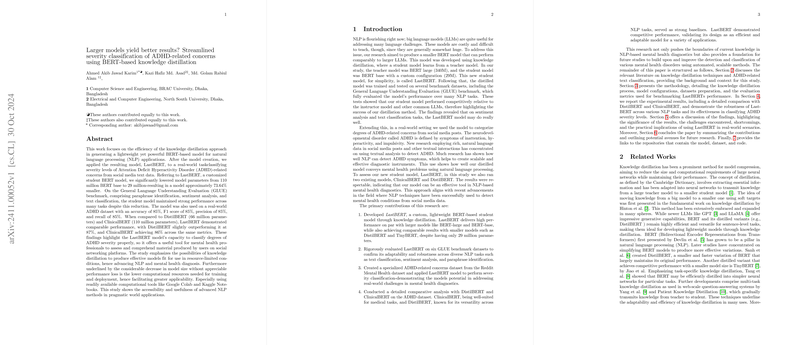Overview of "Larger models yield better results? Streamlined severity classification of ADHD-related concerns using BERT-based knowledge distillation"
The research paper titled "Larger models yield better results? Streamlined severity classification of ADHD-related concerns using BERT-based knowledge distillation" investigates the effectiveness of employing knowledge distillation techniques on BERT models to classify the severity of ADHD-related concerns. The paper primarily aims to develop a smaller, yet efficient model, LastBERT, derived from BERT, that performs well across a variety of NLP tasks while maintaining reduced computational requirements.
Methodology and Experimentation
Model Development: The authors focus on leveraging knowledge distillation to create LastBERT, a model that maintains high accuracy with fewer parameters compared to traditional BERT models. This approach involves using BERT-large as a teacher model and distilling its knowledge into a simpler architecture, effectively balancing performance and efficiency. The paper draws inspiration from established models like TinyBERT and DistilBERT but emphasizes practical feasibility by enabling deployments on affordable, resource-limited platforms such as Google Colab and Kaggle.
Experimental Setup: The research utilizes various datasets to evaluate the performance of LastBERT on ADHD-related classification tasks and general NLP benchmarks. Notably, the model is tested on the General Language Understanding Evaluation (GLUE) benchmark and achieves promising results, indicating robust generalization capabilities across multiple tasks. The key metrics include F1-scores, accuracy, Matthews correlation coefficients, and Spearman correlation coefficients.
Numerical Results and Analysis
The paper reports strong empirical results with LastBERT achieving commendable performance. For instance, on the ADHD-related dataset derived from social media platforms, LastBERT attained an impressive 85% across several evaluation metrics, demonstrating practical relevance in diagnosing mental health concerns. On the GLUE benchmark, LastBERT shows performance competitive to models like BERT-base despite having significantly fewer parameters. The Matthews and Spearman coefficients on tasks like CoLA and STS-B reflect the challenges that arise from using a smaller training dataset during the distillation process.
Implications and Future Directions
Practical Implications: The development of LastBERT holds considerable practical implications, particularly in resource-constrained settings where LLMs such as GPT or LLaMA may not be feasible due to their computational demands. LastBERT facilitates efficient deployment and real-time inference, making NLP tools accessible to a broader audience, including those with limited computational infrastructure.
Theoretical Contributions: From a theoretical standpoint, the paper demonstrates the viability of using knowledge distillation to streamline state-of-the-art NLP models, potentially influencing future research in model reduction techniques. This process underscores the balance required between model size, performance, and applicability, contributing to ongoing discussions about the scalability and efficiency of LLMs.
Future Research: The authors acknowledge certain limitations in LastBERT's performance, attributable partly to the dataset size and scope. Future research could explore more comprehensive pretraining datasets or integrate advanced fine-tuning strategies to further enhance model performance. Additionally, extending its application to other resource-intensive NLP tasks would offer further evidence of its versatility and effectiveness.
In conclusion, the paper offers a substantive analysis of applying knowledge distillation to BERT-based models, presenting a compelling case for producing efficient and lightweight NLP tools. It advances both methodological understanding and practical application within the NLP and mental health diagnostic communities, bridging the gap between theoretical development and practical utility.
